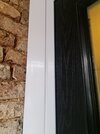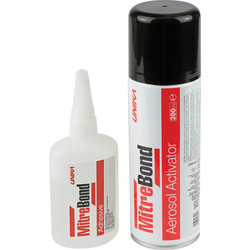A mate is hacking render off a yellow London stock and red rubber brick house.

The render is off now and he is busy replacing the red rubber bricks and polishing the yellow stocks. However when he removed the render from the porch area the uPVC "architrave" around the uPVC front door cracked where it meets the uPVC door frame. It is just a straight profile set at approximately 30 degrees to the door frame where it used to meet the rendered porch.

The porch will be rendered. It might be hard to tell from the image, but a crack has developed where the two uPVC faces meet higher up.
What product would they have used originally to "glue" the meeting faces?
And if the said product is difficult to source- would he be able to use something like superglue?
The section is question is only about 600mm.
BTW, the fitters did not use silicone at the join.
Thanks in advance.

The render is off now and he is busy replacing the red rubber bricks and polishing the yellow stocks. However when he removed the render from the porch area the uPVC "architrave" around the uPVC front door cracked where it meets the uPVC door frame. It is just a straight profile set at approximately 30 degrees to the door frame where it used to meet the rendered porch.

The porch will be rendered. It might be hard to tell from the image, but a crack has developed where the two uPVC faces meet higher up.
What product would they have used originally to "glue" the meeting faces?
And if the said product is difficult to source- would he be able to use something like superglue?
The section is question is only about 600mm.
BTW, the fitters did not use silicone at the join.
Thanks in advance.



